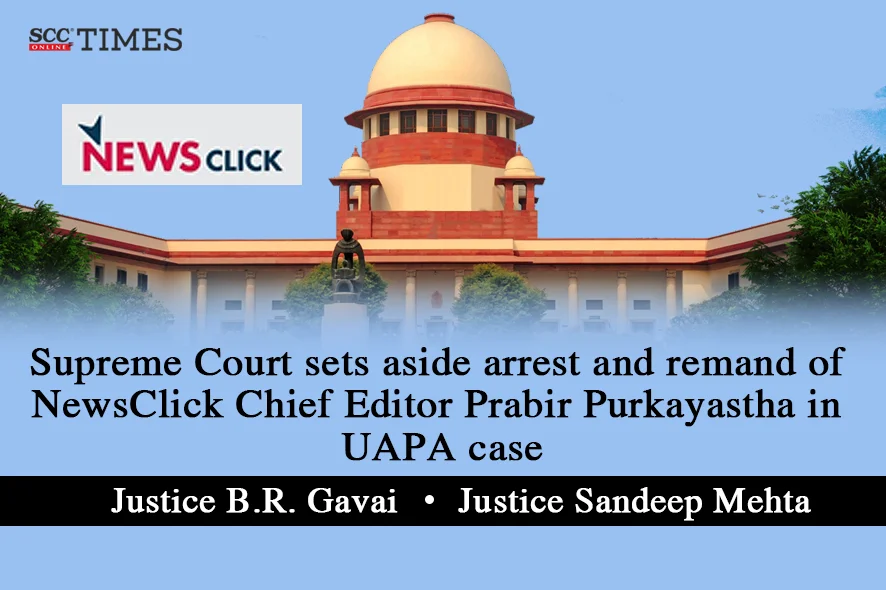Supreme Court: In an appeal filed by Prabir Purkayastha, Chief editor of online news portal NewsClick, against the Judgment passed by Delhi High Court, wherein the Court dismissed his plea challenging his arrest and remand by the Delhi Police in connection with a case under the Unlawful Activities (Prevention) Act (UAPA), 1967, the division bench of BR Gavai and Sandeep Mehta*, JJ. has set aside his arrest and remand and ordered his release subject to him furnishing surety and bail bond.
Background:
Prabir Purkayastha was booked under the UAPA and was arrested on 03-10-2023, following a series of raids conducted due to allegations made in a New York Times article that NewsClick was being paid to boost Chinese propaganda. As per the First Information Report, Prabir Purkayastha has alleged to have illegally received crores of rupees in foreign funds and used the same with an intention to disrupt the sovereignty, unity and security of India.
The Delhi High Court upheld the Trial Court’s decision to remand Prabir Purkayastha to police custody. The High Court held that the Pankaj Bansal v. Union of India, 2023 SCC OnLine SC 1244. is not squarely applicable to arrests made under the UAPA. Thereafter he filed the present petition challenging his arrest and remand.
Court’s order:
The Court took note of Pankaj Bansal (supra) and Section 19 of the Prevention of Money Laundering Act (‘PMLA’) and Sections 43-A, 43-B and 43-C of the UAPA., and said that there is no significant difference in the language employed in Section 19(1) of the PMLA and Section 43B (1) of the UAPA. Thus, the Court held that the interpretation of the phrase ‘inform him of the grounds for such arrest’ made by this Court in the case of Pankaj Bansal(supra) should not be applied to an accused arrested under the provisions of the UAPA.
The Court said that the provision regarding the communication of the grounds of arrest to a person arrested contained in Section 43B (1) of the UAPA is verbatim the same as that in Section 19(1) of the PMLA.
The Court further said that the provisions which lay down a very important constitutional safeguard to a person arrested on charges of committing an offence either under the PMLA or under the UAPA, have to be uniformly construed and applied.
After noting that the modified application of Section 167 Code of Criminal Procedure, 1973 (‘CrPC’) is also common to both the statutes, the Court held that the interpretation of statutory mandate laid down in Pankaj Bansal(supra) on the aspect of informing the arrested person the grounds of arrest in writing has to be applied pari passu to a person arrested in a case registered under the provisions of the UAPA.
The Court said that any person arrested for allegation of commission of offences under the provisions of UAPA or for that matter any other offence(s) has a fundamental and a statutory right to be informed about the grounds of arrest in writing and a copy of such written grounds of arrest have to be furnished to the arrested person as a matter of course and without exception at the earliest.
The Court emphasised that the purpose of informing to the arrested person the grounds of arrest is salutary and sacrosanct inasmuch as, this information would be the only effective means for the arrested person to consult his Advocate; oppose the police custody remand and to seek bail. Any other interpretation would be tantamount to diluting the sanctity of the fundamental right guaranteed under Article 22(1) of the Constitution of India.
The Court said that the right to be informed about the grounds of arrest flows from Article 22(1) of the Constitution of India and any infringement of this fundamental right would vitiate the process of arrest and remand. The Court further added that mere fact that a charge sheet has been filed in the matter, would not validate the illegality and the unconstitutionality committed at the time of arresting the accused and the grant of initial police custody remand to the accused.
After referring to Harikisan v. State of Maharashtra, 1962 SCC OnLine SC 117, the Court said that the grounds on which the liberty of a citizen is curtailed, must be communicated in writing so as to enable him to seek remedial measures against the deprivation of liberty.
The Court reiterated that the requirement to communicate the grounds of arrest or the grounds of detention in writing to a person arrested in connection with an offence or a person placed under preventive detention as provided under Articles 22(1) and 22(5) of the Constitution of India is sacrosanct and cannot be breached under any situation. Non-compliance of this constitutional requirement and statutory mandate would lead to custody, or detention being rendered illegal.
The Court differentiated between the phrases ‘reasons for arrest’ and ‘grounds of arrest’. It said that the ‘reasons for arrest’ in the arrest memo are purely formal parameters would commonly apply to any person arrested on charge of a crime whereas the ‘grounds of arrest’ would be required to contain all such details in hand of the Investigating Officer which necessitated the arrest of the accused.
The Court said that in the present case, a copy of the remand application was not provided to Prabir Purkayastha, or his counsel before passing the remand order on 04-10-2023, thus the grounds of the arrest were not supplied to him in writing. This vitiates his arrest following Pankaj Bansal (supra) The Bench said that it would have released him without surety, but since chargesheet has been filed, it is releasing him with surety and bail bond.
CASE DETAILS
|
Citation: Appellants : Respondents : |
Advocates who appeared in this case For the petitioner: For Respondent: |
CORAM :











